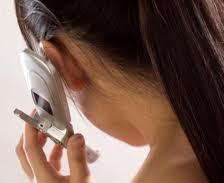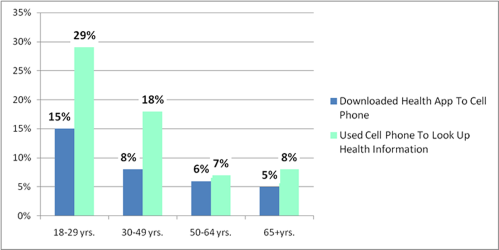February 26th, 2011 by PJSkerrett in Opinion, Research
No Comments »

 We all know that using a cell phone can stimulate the brain to work a bit harder. “Mr. Skerrett? This is Dr. LeWine’s office. Do you have a minute to talk about your test results?” or “Dad, a bunch of kids are going to Casey’s house after the dance. Can I go?” But a new study published in JAMA is making me wonder what the energy emitted by the phone itself — not just the information it delivers — is doing to my brain.
We all know that using a cell phone can stimulate the brain to work a bit harder. “Mr. Skerrett? This is Dr. LeWine’s office. Do you have a minute to talk about your test results?” or “Dad, a bunch of kids are going to Casey’s house after the dance. Can I go?” But a new study published in JAMA is making me wonder what the energy emitted by the phone itself — not just the information it delivers — is doing to my brain.
Here’s the study in a nutshell. Dr. Nora Volkow and her colleagues recruited 47 volunteers to have their brain activity measured twice by a PET scanner. Both times the volunteer had a cell phone strapped to each ear. During one measurement, both phones were turned off. During the other, one phone was turned on but muted so the volunteer didn’t know it was on; the other was left off. Each session lasted about an hour. The scans showed a small increase in the brain’s use of glucose (blood sugar) when the phone was on, but only in parts of the brain close to the antenna.
It was an elegant study. The researchers took pains to anticipate sources of error. They used a control (both phones off) against which to compare the effect of a “live” cell phone. They used cell phones on each ear, one on and one off, to see if the effect was localized. They muted the phone that was on to eliminate the possibility that any brain activation was due to listening to the sound of a voice coming through the phone’s speaker. So the result is probably a real one, not an artifact or measurement error.
What does this brain activation mean? No one really knows. As Dr. Volkow told NPR, “I cannot say if it is bad that they [cell phones] are increasing glucose metabolism, or if it could be good.” Read more »
*This blog post was originally published at Harvard Health Blog*
November 18th, 2010 by StevenWilkinsMPH in Better Health Network, News, Opinion, Research
No Comments »

What do cell phones and health-information seeking have in common? Very little, at least among the chronically ill (e.g., the folks who are driving healthcare use and cost). An American Medical News article about the latest Pew Research Center’s Internet & American Life Project study on mobile phone use caught my eye. The introduction to the article reads:
Despite the proliferation of cell phones in the United States, the number of people using them to access health information is low. But experts believe the sheer number of people using mobile phones and wireless devices means that health information eventually will get more mobile as well.
According to the study, 85 percent of Americans use mobile phones, but only 17 percent of cell phone owners have used them to look up health information. Nine percent of Americans have downloaded a health-related app on their cell phone.

Get this: The highest use of cell phone health-information seeking and downloading cell phone health apps was among 18- to 29-year olds at 29 percent and 15 percent respectively. With the exception of accidents, 18- to 29-year-old adults are generally among the most healthy demographic. Read more »
*This blog post was originally published at Mind The Gap*
October 1st, 2010 by Michael Sevilla, M.D. in Better Health Network, Health Tips, News
No Comments »

 It’s not surprising to people that I’m a “techy” type of guy. Reading tech stories about the latest gadgets is a nice occasional escape from work. One of the ways that medicine and tech intersect is in some “overuse injuries” that I’ve seen and talked with people about. When the Nintendo Wii first came out, there were many stories of “Wii-itis” and tendonitis-related injuries.
It’s not surprising to people that I’m a “techy” type of guy. Reading tech stories about the latest gadgets is a nice occasional escape from work. One of the ways that medicine and tech intersect is in some “overuse injuries” that I’ve seen and talked with people about. When the Nintendo Wii first came out, there were many stories of “Wii-itis” and tendonitis-related injuries.
Last week American Medical News interviewed me for a story posted on their site [on September 27th] called “New Personal Technology Creating New Ailments.” The article opens like this:
When Mike Sevilla, MD, sees young patients at his Salem, Ohio, family practice, he often finds them text messaging or listening to music on portable media players. These tech-savvy patients may not realize it, but they could be on the way to developing health problems related to overuse of personal technology. That’s why Dr. Sevilla uses such exam room encounters as a springboard to talk about the potential health impact of today’s tech devices.
“I talk about listening to loud music and being distracted while driving. … I bring up those examples of people who were hurt or killed because they could not disconnect themselves from their cell phone,” he said. Dr. Sevilla and other physicians across the nation are adding questions about cell phone use and computer habits to the office visit at a time when dependence on electronic devices has reached unprecedented levels.
The article goes on to say that the most common physical problems that are seen include problems with vision, elbow, thumb, and wrist. These are due to prolonged use of computers and mobile devices like cell phones and electronic handheld devices. Read more »
*This blog post was originally published at Doctor Anonymous*
 We all know that using a cell phone can stimulate the brain to work a bit harder. “Mr. Skerrett? This is Dr. LeWine’s office. Do you have a minute to talk about your test results?” or “Dad, a bunch of kids are going to Casey’s house after the dance. Can I go?” But a new study published in JAMA is making me wonder what the energy emitted by the phone itself — not just the information it delivers — is doing to my brain.
We all know that using a cell phone can stimulate the brain to work a bit harder. “Mr. Skerrett? This is Dr. LeWine’s office. Do you have a minute to talk about your test results?” or “Dad, a bunch of kids are going to Casey’s house after the dance. Can I go?” But a new study published in JAMA is making me wonder what the energy emitted by the phone itself — not just the information it delivers — is doing to my brain.





 It’s not surprising to people that I’m a “techy” type of guy. Reading tech stories about the latest gadgets is a nice occasional escape from work. One of the ways that medicine and tech intersect is in some “overuse injuries” that I’ve seen and talked with people about. When the Nintendo Wii first came out, there were many stories of “Wii-itis” and tendonitis-related injuries.
It’s not surprising to people that I’m a “techy” type of guy. Reading tech stories about the latest gadgets is a nice occasional escape from work. One of the ways that medicine and tech intersect is in some “overuse injuries” that I’ve seen and talked with people about. When the Nintendo Wii first came out, there were many stories of “Wii-itis” and tendonitis-related injuries.







